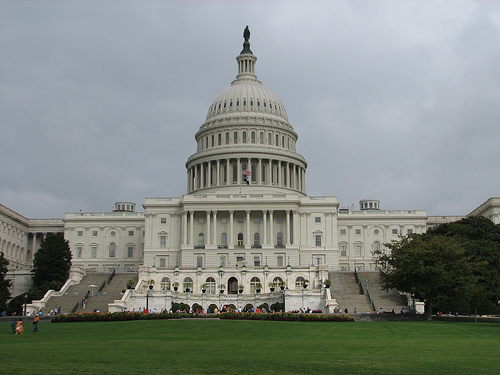Finally, someone makes the argument that requiring 60 votes on every piece of legislation is not what the Framers intended. Here's the problem, in a nutshell:
So on the health care bill, as on so many other things, we now have to take what a minority of an inherently unrepresentative body will give us. Forty-one senators from our 21 smallest states — just over 10 percent of our population — can block bills dealing not just with health care but with global warming and hazards that threaten the whole planet. Individual senators now use the filibuster, or the threat of it, as a kind of personal veto, and that power seems to have warped their behavior, encouraging grandstanding and worse.
Ending filibusters require supermajorities. In effect, any bill cannot be passed if there is a filibuster standing in its way. This is clearly not what the Framers wanted:
Here’s why. First, the Constitution explicitly requires supermajorities only in a few special cases: ratifying treaties and constitutional amendments, overriding presidential vetoes, expelling members and for impeachments. With so many lawyers among them, the founders knew and operated under the maxim “expressio unius est exclusio alterius” — the express mention of one thing excludes all others. But one need not leave it at a maxim. In the Federalist Papers, every time Alexander Hamilton or John Jay defends a particular supermajority rule, he does so at length and with an obvious sense of guilt over his departure from majority rule.
References to the tone taken by Hamilton and Jay in The Federalist Papers are not particularly persuasive. However, the explicit mention of supermajorities by the Constitution does create, in my view, a negative inference that all other legislation must be passed by majority.
Second, Article I, Section 3, expressly says that the vice president as the presiding officer of the Senate should cast the deciding vote when senators are “equally divided.” The procedural filibuster does an end run around this constitutional requirement, which presumed that on the truly contested bills there would be ties. With supermajority voting, the Senate is never “equally divided” on the big, contested issues of our day, so that it is a rogue senator, and not the vice president, who casts the deciding vote.
The procedural filibuster effectively disenfranchises the vice president, eliminating as it does one of the office’s only two constitutional functions. Yet the founders very consciously intended for the vice president, as part of the checks and balances system, to play this tie-breaking role — that is why Federalist No. 68 so specifically argued against a sitting member of the Senate being the presiding officer in place of the vice president.
I find this more persuasive. The filibuster effectively denies the VP one of his constitutional duties.
Third, Article I pointedly mandates at least one rule of proceeding, namely, that a majority of senators (and House members, for that matter) will constitute a quorum. Article I, Section 5 states in part that “a majority of each shall constitute a majority to do business.” Of course, in requiring a simple majority for a quorum, the founders were concerned about no-shows for a host of reasons — not least of all because the first legislators had to travel great distances by stagecoach.
That's nice, but I don't think that really speaks to passing of legislation.
But the bigger reason for the rule was to keep a minority from walking out and thereby blocking a majority vote. In Federalist No. 75, Hamilton dismissed a supermajority rule for a quorum thus: “All provisions which require more than a majority of any body to its resolutions have a direct tendency to embarrass the operations of the government and an indirect one to subject the sense of the majority to that of the minority.”
It would be illogical for the Constitution to preclude a supermajority rule with respect to a quorum while allowing it on an ad hoc and more convenient basis any time a minority wanted to block a vote. Yet that is essentially what Senate Rule 22 achieves on any bill that used to require a majority vote.
That makes sense.
The problem is, how does this get changed? It is unlikely that the U.S. Supreme Court would dare intervene in Senate Rules — that would be one branch of government monkeying around with the internal procedural rules of another branch. Mind you, I think the Supreme Court should do that, but I'm fairly certain they won't. The author proposes another solution:
The president of the Senate, the vice president himself, could issue an opinion from the chair that the filibuster is unconstitutional. Our first vice presidents, John Adams and Thomas Jefferson, felt a serious obligation to resolve the ties and tangles of an evenly divided Senate, and they would not have shrunk from such a challenge.
That's all well and good, but once the VP does that, we find ourselves in a bit of a constitutional crisis which will have to be resolved by…. the courts. And we're back to Square One.
Still, I'm glad there is dialogue about this.

